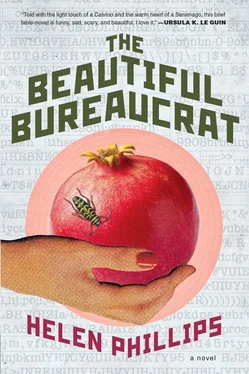Josephine nodded emphatically, eager to escape both Trishiffany’s friendliness and her own burdensome feeling of gratitude.
“Thank you,” she said, pressing the door shut behind her, “thank you, thank you!”
“Mind if I call you Jojo?” Trishiffany was saying. “I’ve always wanted to call someone that. Such a cute nickname for Josephine!”
HS89805242381: There had been a merciful Post-it note tucked between two rows of the computer keyboard this morning— memorize/destroy —and now, returning to her desk, Josephine could input the password as deftly as though it were her own Social Security number.
Preoccupied — and, as had become routine at this time of the month, disheartened — by what happened in the bathroom, she absentmindedly reached for the mouse to locate the entry for FIKIOTIS/MARJORIE/LORDES. But the Database froze, refusing to let her scroll. Her throat tightened at this discovery; she could only move around the Database by using the search function, so she could never know its size.
Still, she typed the number of FIKIOTIS/MARJORIE/LORDES into the search function. She was cross-checking the file when it occurred to her that she hadn’t told Trishiffany her name. She looked up from the screen, trying to remember. Had she let it slip? She noticed a dark smudge on the pinkish ill-colored wall. Her fingers fell away from the keyboard, reached over to touch it. As her gaze moved outward from the smudge, she realized it wasn’t just years of tack holes and tape that made these walls look so tired. These were scratches, smears, shadowy fingerprints, the echoes of hands.
She wanted to call Joseph, but ever since he’d started his new job he never picked up at work. Anyway, as per Trishiffany’s promise, her own cell was showing just one faint bar of service, and there was no landline on her desk.
The four walls were very slowly, almost imperceptibly, moving closer together, pressing in toward one another, toward her. She tried to take a deep breath but there was no air. She stood up, knocking FIKIOTIS/MARJORIE/LORDES off the desk, paperwork swirling downward. She ran to the door and escaped the room.
She’d go right back in, of course; it was only a momentary thing, a passing panic. Yet her feet continued to carry her away from 9997, down the concrete hallway toward the EMERGENCY EXIT sign. She had a goody-two-shoes flash of fear as she pressed against the heavy door. But no sirens blared when she burst into a silent stairwell. A flight of concrete steps led upward and downward, no end in sight.

Seven Virgin Mary candles glowed in the stranger’s apartment, battling the unclean dimness. The place smelled like wax and warm butter. In the galley kitchen, Joseph was boiling spaghetti by candlelight.
“How religious,” Josephine said, dropping her bag by the door.
“All they had were Virgins,” he said.
“No, I like them,” she said. Each Virgin wore a royal-purple robe.
It wasn’t characteristic of Joseph to buy candles, but neither was it uncharacteristic. He was both sides of the coin. Had no patience for movies with happy endings, was always instantly trusted by children.
They ate on a blanket spread out to protect them from the murkiness of the floor. She felt happy. The spaghetti, the butter.
“So, how’d it go?” he said.
She didn’t want to think about the smudged walls, the infinite stairwell. May we never discuss it at home.
“I got my period,” she said. “I bled. All over the bathroom floor.”
He was quiet. Disappointed, again. Month after month after month.
“It was embarrassing,” she continued, as though immune to his disappointment, “and messy, but this nice woman helped me.”
“Someday we’ll have a different kind of life,” he said.
She wanted to ask what exactly he meant, and hadn’t they already tried to have a different kind of life by moving to this city, but she was tired and she let it slide.
Later, she was lying on the stranger’s futon. It was time to sleep. Every night he turned off the lights: the dirty switch in the dorm room, the assorted lamps in the various hinterland rentals, the chain of the lightbulb in the apartment from which they had been outcast. She watched him walk around the room, blowing out the Virgin candles one by one.

The files continued, endless. She input 140, 150, 160 a day, experiencing at times a small feeling of accomplishment — and then the next morning there would be another pile of 147 or 153 or 164 awaiting her. She never knew who delivered them in the morning or who took them away in the evening. It irked her to think of the people to whom the names belonged. To know that while she was stuck in this office, they were very likely out and about in the world, strolling down treelined blocks or sipping coffee or taking their children to school. Handling all that paperwork dried out her hands; they became so raw with paper cuts that she couldn’t squeeze a slice of lemon. Her forearms ached, her jaw was permanently clenched, her eyes felt dusty. Yet she did what she had to do. She hurried down the hallway, tried to ignore the typewriters’ drone. She didn’t lose herself in the contemplation of the fingerprinted walls or in speculation about the dizzying boxes of text on the forms. For nineteen unemployed months, she had sworn that if she ever managed to get another job, she would never complain.
And there was a certain satisfaction in it, in making her way through the piles of gray files, in noting the odder or more colorful names, in observing the small yet striking coincidences (a triumvirate of surnames that ended with “X,” someone with the initials “SOB,” a pair of Michael Jacksons), in sliding the files one by one into Outgoing. She pictured herself building a wall. Stone by stone by stone. She was precise and rigorous. Occasionally she’d catch a minuscule error (exchange the Database’s MAR Y for the form’s MAR IE , insert the space in the surname DEL SOL).
Still, the distance between four o’clock and five o’clock, between 148 files and 166 files, often felt interminable. Sometimes, in the depths of the afternoon, Josephine would have a thought — an intense, riveting thought, incongruous with her current task and location, something she ought to share with Joseph, a hint of a scene from a dream or a forgotten memory from when she was a kid, a complicated pun or a new conviction about how they ought to live their lives — but then the moment would pass and the thought would be lost, trapped forever between the horizontal and vertical lines of the Database. She’d spend the rest of the workday mourning the loss, resenting the jail cell from which her thought would never escape. In the late afternoon, frantic for respite of any sort, she might pull a yogurt and spoon out of her bag and peel back the foil and shut her eyes and begin to eat it blind.
It was of course at precisely such moments that The Person with Bad Breath always happened to open the door. Instinctively, Josephine would hide her food beneath her desk, not so much to conceal the fact that she was pausing to eat but rather so that no molecule of The Person with Bad Breath’s breath might approach her spoon.
“Remember, you need the Database as much as the Database needs you!” The Person with Bad Breath might say, or some other similar platitude, slipping a mint between dry lips.
Josephine would respond with the all-purpose hinterland grin of her childhood, and as soon as the door swung shut behind The Person with Bad Breath, a wave of relief would carry her through the remaining files.
Читать дальше





![Unknown - [Carly Phillips] The Bachelor (The Chandler Brothe(Bookos.org) (1)](/books/174132/unknown-carly-phillips-the-bachelor-the-chandle-thumb.webp)








